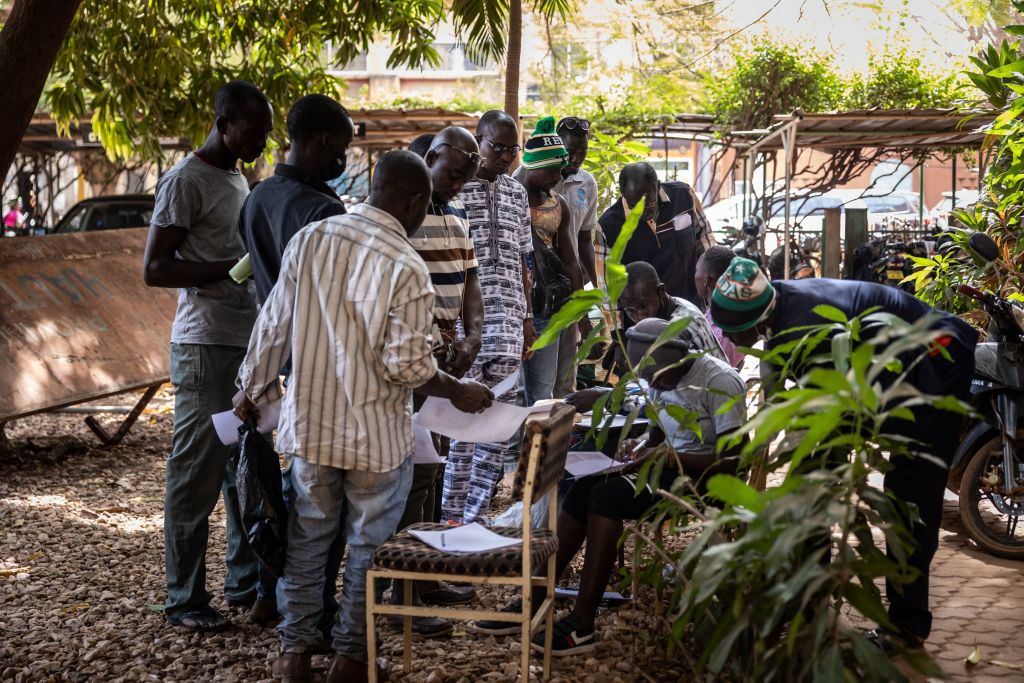ADF STAFF
As Burkina Faso endures deadly attacks by extremist groups, the transitional government is enacting a controversial counterterror strategy that could put more civilians in harm’s way.
Shortly after seizing power in September 2022, Burkina Faso’s military junta publicly campaigned to recruit citizens into the fight. Months later, eyewitnesses reported cases of forced recruitment.
On April 13, the transition government announced its latest move, a “general mobilization.”
Authorities issued an advisory giving junta leader Ibrahim Traoré “the right to requisition people, goods and services and the right to restrain certain civil liberties,” a security source told Agence France-Presse.
A recent attack underscored the danger of sending lightly trained civilians to the frontline battlegrounds of northern Burkina Faso.
Terrorists attacked a group of Soldiers and civilian volunteers near Aorema village on April 15, killing 34 members of the Volunteers for the Defence of the Fatherland (VDP) and six Soldiers and injuring 33 more, according to a statement from local authorities.
The detachment “was the target of an attack by unidentified armed men,” the Ouahigouya governor’s office said.
Weeks after overthrowing a previous military junta, Traoré’s transition government launched a campaign to recruit 50,000 citizens to the VDP in October 2022.
By the end of November 2022, they claimed to have recruited 90,000.
The VDP is a militia created in December 2019 to help ward off the expanding threat of Sahelian terror groups linked to al-Qaida and the Islamic State, both of which are active in the northern territories that border Mali and Niger.
Rebels control about 40% the country, according to regional mediator Mahamadou Issoufou.
The conflict has displaced 2 million people and killed more than 12,000 Burkinabe since the insurgency spread there in 2015, the Armed Conflict Location and Event Data project reported in February 2023.
In March, the arrest of Boukaré Ouedraogo who leads a civil society group known as the “Appel de Kaya,” sparked outrage and protests on social media.
Less than a week after criticizing Traoré’s security response, Ouedraogo met with the transition president in Kaya on March 22 and was taken by soldiers as he left. A few days later, he was seen in military fatigues, training with an automatic weapon on a firing range.
Two other civil society organizations denounced the “arbitrary arrest,” called for Ouedraogo’s release and condemned the “current trend of recurrent and systematic denial of citizens’ freedom of opinion and expression.”
During a March 25 meeting with citizens of Kaya, Traoré admitted he ordered the enlistment of an unnamed citizen, accusing him of revealing information that led to an attack near the town.
“By [his] fault, men fell,” he said. “We made him understand and we hired him immediately to be a [VDP]. And so it will be with all those who are not capable of defending the country,” he said to the cheers of the audience.
The other civil society groups also claimed on March 25 that authorities arrested and registered as VDPs two of their members who publicly criticized the government transition.
“This situation is very worrying for human rights,” civil society leader Daouda Diallo told Radio France Internationale. “Their families have not heard from them since they were arrested.”
Critics have rebuked forced recruitment, saying it undermines the government’s cause and could aid terrorists.
The latest call for a general mobilization makes it appear the government is doubling down on this strategy.
“Faced with this security situation, the health of the nation depends on a surge of national spirit by all its daughters and sons in order to find a solution,” Defense Minister Col. Maj. Kassoum Coulibaly said in a statement.

